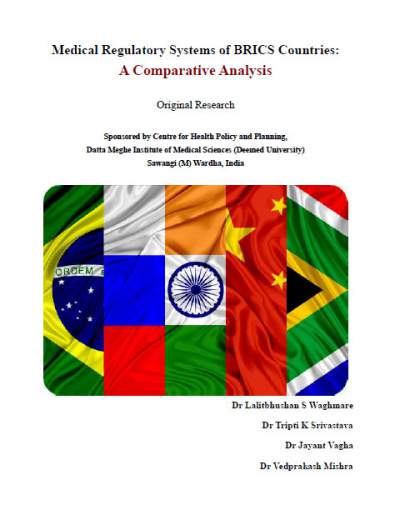
Title:
Medical Regulatory Systems of BRICS Countries: A Comparative Analysis
Authors:
Dr Lalitbhushan S Waghmare
Dr Tripti K Srivastava
Dr Jayant Vagha
Dr Vedprakash Mishra
PREFACE
BRICS and other multinational groupings are useful to policy- makers involved in the development of foreign policies. However, it remains unclear if such groupings have a role in the study and development of global health policy. The debate around this issue and focus on the potential role of BRICS in the pro-motion of universal health coverage - an "umbrella" goal for health in the post-2015 development framework Brazil, the Russian Federation, India, China and South Africa - in the international arena have risen enormously in recent decades. The increasing internationalization of the medical profession raises the issue of safeguarding the practice of medicine and the use of the medical workforce. These years, medical education is showing trends that also dominate other fields of higher education. Within the framework of internationalization, globalization, and cross-border education, and driven by the development of information and communication technology as well as by pronounced migration of medical doctors, there are economic and managerial consequences such as commercialization and privatization in a variegated mix of for-profit and not-for-profit providers.
Health appears for the first time as a discussion point in the Sanya Declaration at the 3rd BRICS Summit in 2011 in China, with regard to HIV/AIDS. Since then the group has held annual meetings devoted to health, with the first meeting of the BRICS health ministers hosted by the Chinese in Beijing in July that year. In 2012, the BRICS health ministers also decided to meet every year on the side-lines of the World Health Assembly.
The BRICS countries were being discussed, but there was very little published on their role in health. It was an obvious area to explore. What interested us most was the extent to which they were acting as a unified bloc: looking at what they were doing, compared with the rhetoric, was fascinating. It's interesting to see a new center of power emerging in global health with a new set of priorities that contrast with the dominant western health development paradigm.
Many efforts have preceded to have a common platform for the standardization, accreditation and mutual recognition of the qualifications in European union Countries and they have proven to be largely rewarding for the region. The World Health Organisation (WHO) has promoted regulatory capacity building, collaboration and harmonization for a long time and will continue to do so. No such effort however has been initiated for the BRICS countries.
The first step towards doing so is to understand the medical regulatory systems of these diverse countries and to proceed with the comparative analysis. The Centre for Health Policy and Planning (CHPP), Jawaharlal Nehru Medical College, Sawangi(M), Wardha, India, had undertaken the current study for the purposes of increasing the level of understanding and identify similarities and differences between medical regulation in the India and in other similar regulatory jurisdictions which shall further help CHPP in developing the policy towards strengthening the collaborations between BRICS countries.
The structure, remit and values of medical regulation vary in significant ways between the countries examined. The countries surveyed have developed a number of different medical regulatory systems and, while all have departments of health, the development of standards and codes of ethics together with responsibility for the regulation of individual doctors has been devolved to other organizations. In terms of their remit, the medical regulatory organizations in the countries surveyed set as their primary objectives a combination of registering/licensing medical practitioners, setting standards for the profession, promoting best practice and patient safety, promoting fair access to healthcare and regulating medical education. In most of the countries in this study, medical regulatory authorities do not formally distinguish between registration and licensing processes, and registration alone may be sufficient to entitle doctors to practice. The requirements for a license to practice medicine are relatively similar across all analyzed countries. Revalidation of registration is uncommon in the countries examined. None of the countries we examined have a formal system for revalidation except for a partial exception in India where re-registration requirements vary by state, with some states (e.g. Delhi, Maharashtra) issuing registrations for a stipulated period of time (generally 5 years) with the requirement to renew thereafter (although renewal is purely administrative. The proposed process would use a points system, and be tied explicitly to Continuous Professional Development (CPD).
All countries surveyed have a code of medical ethics which follows a relatively uniform pattern. Quality Assurance in medical education is in place , however, the bodies responsible for these functions vary from country to country. While in some (India, South Africa,) the formal regulation of medical education is primarily the remit of the medical regulatory body, in others, responsibilities are shared between medical councils, local authorities, and ministries or health and/or education (Brazil China and Russia).
The authors have tried to provide an in-depth analysis of five medical regulatory systems of future economic superpowers of the world. Sub-regional and regional collaboration between governments and regulators is vital to create a predictable harmonized "quality market for quality medical education". We feel it's a humble beginning, which may pave a way for further research on regulatory systems of the World.
|

|

